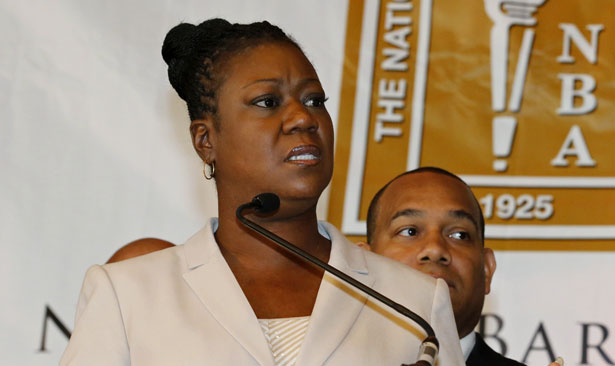
Sybrina Fulton mother of Trayvon Martin, speaks at the National Bar Association annual convention, July 29, 2013. (Reuters/Joe Skipper)
Sybrina Fulton, mother of Trayvon Martin, has been a textbook example of courage in the seventeen months since her youngest son was killed by George Zimmerman. Thrust into the public sphere during a time of great personal tragedy, Fulton has carried her pain with incredible poise. It was no different when she spoke before the National Urban League in Philadelphia this past Friday. She told the audience: “My message to you is please use my story, please use my tragedy, please use my broken heart to say to yourself, ’We cannot let this happen to anybody else’s child.’ ”
In that moment, she made the connection between herself and Mamie Till, mother of Emmett Till, the teen slain in 1955 for allegedly whistling at a woman, even stronger. Speaking on her decision to have an open casket at his funeral after her son’s face had been so badly beaten and disfigured he was unrecognizable, Mamie said: “I wanted the world to see what they did to my baby.” These mothers of black sons publicly asked us to use their pain to seek justice. However, the way we use that pain cannot diminish the reality of the people who live with it. By which I mean, we have a bad habit of acting as if black women exist only as props in the story about black men and it’s time to stop.
Black women’s pain fuels but then becomes obscured in the popular narrative about the consequences of racism and the fight for racial justice, as it becomes framed through the experiences of black men. All of us who do work around these issues are guilty of this oversight, myself included. In our attempts to address the problem of anti-black racism in the US, we neglect to consider the experiences of black women as part of that story.
While the Congressional Black Caucus convened a meeting to discuss the plight of black men and boys, black women and girls who suffer under the same systems of oppression being discussed as problematic for our boys have been left out of the public discourse. We talk often of the criminalization of black boys, and point to the school-to-prison pipeline as an example, but fail to mention the ways it affects black girls, as Monique W. Morris laid out in her report for African American Policy Forum in March of this year. According to Morris: “Black women and girls continue to be over-represented among those who are in contact with the criminal and juvenile justice systems. Black girls continue to experience some of the highest rates of residential detention. Black girls represent the fastest-growing segment of the juvenile justice population, and they have experienced the most dramatic rise in middle school suspension rates in recent years.” Yet, the problem continues to be framed as a nearly exclusive to black men and boys.
Popular
"swipe left below to view more authors"Swipe →
The same is true of New York City’s stop-and-frisk policy. While it’s true that the policy disproportionately targets black men, black women are also subjected to these supposedly random searches whose constitutionality has been challenged. Additonally, according to The New York Times, “stops of women by male officers can often involve an additional element of embarrassment and perhaps sexual intimidation.”
At times like this, it’s important to remind ourselves of our history. As Danielle L. McGuire expertly documented in her 2010 book At the Dark End of the Street, one of the major catalysts of the civil rights movement of the 1950s and ’60s was the dehumanization experienced by black women. The bus boycotts began because of the physical threat and sexual terror heaped upon black women’s bodies, in addition to having to ride in the back. And while a young Martin Luther King Jr. grabbed the headlines, it was a great number of black women paying the day-to-day price of movement building, organizing and doing field work, only to have their contributions minimized in favor of a “great man” reading of history.
Writing for The Guardian, Jamila Aisha Brown put it this way: “The victimization of young women is subsumed into a general well of black pain that is largely defined by the struggles of African-American men. As a result, any insight about this important intersection of race and gender is lost under the umbrella of a collective sense of persecution.”
The stories of black men are important, but they are not a stand-in for the stories of all black people. We can’t continue using the pain of black women’s lives to explain our existence if we are then going to pretend that pain isn’t worth examining on its own. We dishonor the courage of the Mamies and Sybrinas of the world when we do.
What the Zimmerman verdict teaches us about race in America.


